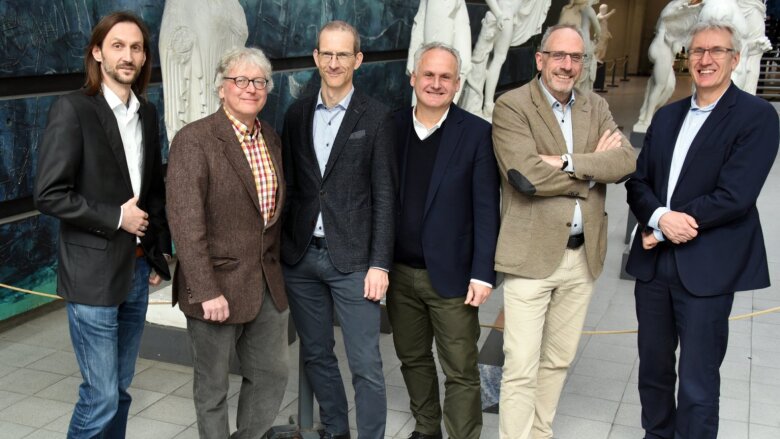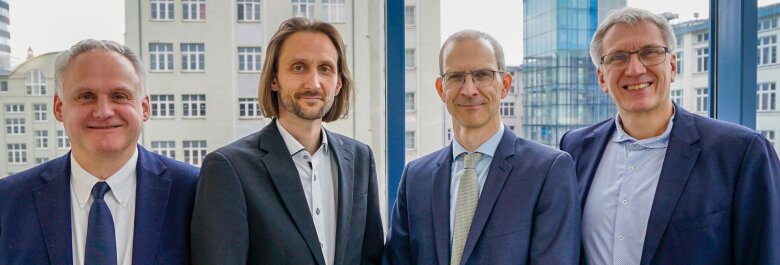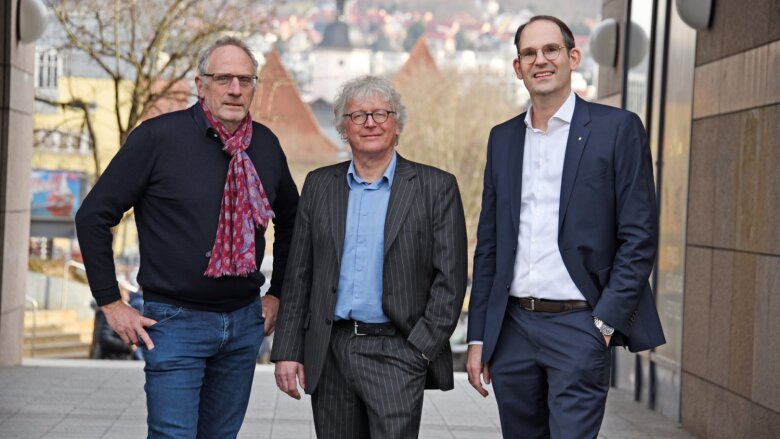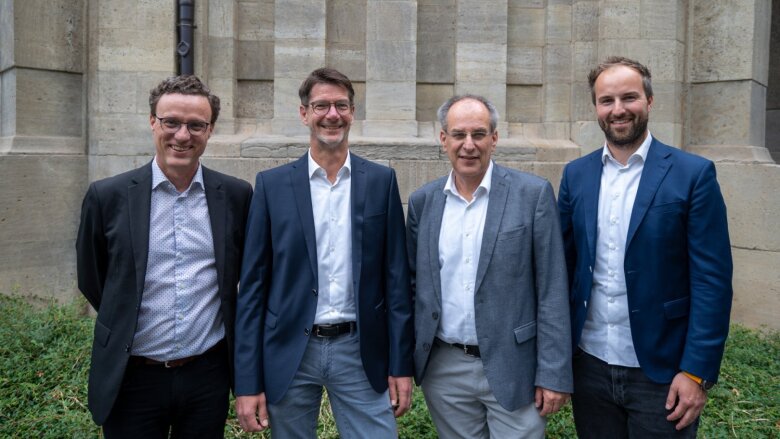
-
Corporate Governance: Management and Corporate Control (CG)
The picture shows the professors Benjamin Auer, Mike Geppert, Bernd Hüfner, Harald Jansen, Christian Lukas and Peter Walgenbach
Image: Anne Günther (University of Jena)The chairs of the Corporate Governance: Management and Corporate Control specialisation deal broadly with issues of corporate governance. Corporate governance refers to the legal and factual framework for the management and supervision of a company. Management and control refers to the totality of management tasks that serve to implement and monitor corporate decisions.
The chairs in this specialisation focus their research on different aspects of corporate governance.
Prof. Dr. Jansen's chair uses information economics and agency theory approaches to investigate the influence of taxation on the regulation of managerial decisions. In a sometimes uncertain regulatory environment, this also includes the influence of tax contract design on the development of the legal regulatory framework.
Prof. Auer's chair teaches how managers can identify and contain standard and life-threatening business risks (in procurement, sales, credit or foreign exchange transactions). This includes not only the fundamental dynamics of derivative financial products and financial mathematical approaches to their valuation, but also the question of their specific practical use and the problems that arise. Overall, students will be provided with a package of knowledge, methods and applications that will enable them to stabilise corporate cash flows, reduce uncertainties in project planning and optimise corporate financing and investment strategies.
The chair of Prof. Dr. Lukas deals with the analysis of dynamic incentive problems, behavioural controlling and experimental controlling research.
Prof. Hüfner's chair focuses on the conceptual analysis of German and international accounting, share valuation and financial reporting, which are central aspects of corporate governance.
The Chair of Prof. Dr. Walgenbach focuses on issues related to the design and change of organisational structures. Organisational structures serve to align the actions of the members of the organisation with the objectives of the company.
The chair of Prof. Dr. Geppert examines power relations in companies, political conflicts and conflict resolution mechanisms. Also the relationships between actors and firms in global value chains and transformation processes in the global economy an analysed.
Participating professors:
- Finance - Prof. Dr. Benjamin R. Auer de
- Strategic and International Management - Prof. Dr. Mike GeppertExternal link
- Accounting - Prof. Dr. Bernd Hüfner de
- Taxation and Auditing - Prof. Dr. Harald Jansen de
- Controlling - Prof. Dr. Christian Lukas de
- Organisation, Leadership und Human Resource Management - Prof. Dr. Peter WalgenbachExternal link
-
Finance, Accounting & Taxation (FAcT)
The picture shows the professors Bernd Hüfner, Benjamin Auer, Christian Lukas and Harald Jansen
Image: David DelkusThe research focus FAcT covers the fields of Finance, Accounting & Controlling, and Taxation. It is supported by the following chairs:
- Finance – Prof. Dr. Benjamin R. Auer de
- Accounting – Prof. Dr. Bernd Hüfner
- Controlling – Prof. Dr. Christian Lukas de
- Taxation and Auditing– Prof. Dr. Harald Jansen de
Financial decision-making problems are highly diverse, complex, and often interdependent. In a market-driven environment with continuously evolving legal frameworks, the FAcT field is therefore constantly confronted with new challenges of considerable scientific relevance.
Examples of key research questions within FAcT include:
- How can optimal sustainable financial investments be designed, and how can investors be protected against fund manager misconduct?
- How should (non-)financial incentives for chief physicians in hospitals be structured to achieve effective outcomes?
- How do design principles influence the quality of corporate financial and sustainability reporting?
- Do multinational corporations pay less tax after digitalization—or do small and medium-sized enterprises also face comparable effects?
Further details on the specific research profiles of the chairs contributing to the FAcT focus can be found on the respective websites listed above.
-
Strategy, Management and Marketing (SMM)
"Strategy, Management and Marketing" addresses economic and social science-oriented topics in research with regard to markets, organizations and end customers. Important reference points for the research activities are paradigms of organizational and management research as well as a pronounced behavioral science orientation. The research foci of the participating chairs include:
- Global and local transformation processes in organizations in economy and society, politics, conflicts and conflict resolution mechanisms in the context of multinational enterprises, actor and corporate relations in global value chains, (Prof. GeppertExternal link),
- organizational structures, behavior of organizational members, management of change (Prof. WalgenbachExternal link) as well as
- decisions in the context of strategic marketing, the design of innovation management, sales management and sustainable marketing and innovation (Prof. Zacharias de).
The SMM team - Professors Walgenbach, Geppert and Zacharias (from left to right)
Image: Anne Günther (University of Jena) -
Supply Chain Management (SCM)
Industry 4.0, e-commerce and autonomous driving are just three buzzwords that describe the radical change in today's economic life. Innovative digital business models require many processes to be restructured and redesigned. In the SCM area, we are researching how to design value chains with the help of modern optimization tools and data analytics methods. Examples of special research topics are:
- Innovations on the "last mile" including drones, autonomous delivery robots, and mobile parcel lockers
- How can artificial intelligence methods speed up combinatorial optimization?
- Optimizing ER rosters
- Optimization of manufacturing processes in the automotive industry in the industry 4.0 era
Participating professors:
-
Economics and Strategy
Oliver Kirchkamp
Our time sees a permanent increase in production, distribution and consumption of knowledge and information. Economic exchange is more and more shaped by exchange of information through differentiated mechanisms. We investigate decision making, strategic interaction and cooperation of firms and individuals to understand and to develop better economic mechanisms. In our research we use theoretical models and laboratory experiments. The findings of this research may have implications for the design of platforms of economic exchange. Specifically, in a world where climate change requires global cooperation, a good understanding of strategic interaction helps evaluating policy options, informs the design of market-based mechanisms, such as carbon taxes and cap-and-trade systems, and helps designing incentives to reduce emissions.
Labor
Image: Oliver Kirchkamp -
Innovation and Change
The picture shows the professors Miranda, Graf, Cantner and Menter (from left to right).
Image: David DelkusInnovations in the form of new products and processes as well as social innovations are the drivers of technological change, economic growth, and social welfare. With our research, we want to contribute to a better understanding of the sources, prerequisites, and effects of innovations, especially in the context of concurrent transformative change. Within this broad field of research, we are particularly concerned with the following topics:
- Entrepreneurship and entrepreneurial ecosystems
- Industrial dynamics and evolution
- Productivity, structural change, and growth
- Sustainability and transformative change
- Knowledge networks and regional innovation
- Technology transfer and entrepreneurial universities
- Research and innovation policy
Participating professors:
- Microeconomics (Prof. Cantner)
- Business Dynamics, Innovation and Economic Change (Prof. Menter)
- Economics of Innovation (PD Dr. Graf)
- Microeconomics, Productivity Research (Prof. Miranda)External link
-
Macroeconomics and Financial Markets
The picture shows Professors Daniel Streitz, Huyen Nguyen and Roland Winkler.
Image: Macroeconomics and Financial MarketsThe Global Financial Crisis of 2007–2008 and the euro area’s sovereign debt crisis of 2010–2012 exemplify how financial crashes can lead to severe recessions. Building on the lessons learned from these events, the Financial Markets Group and the Macroeconomics Research Group have joined forces to advance research at the intersection of macroeconomics and finance. Our goal is to deepen the understanding of the root causes of financial crashes, the intricate interplay between financial markets and the macroeconomy, and how economic policy can foster financial and macroeconomic stability.
The Financial Markets Group focuses on the functioning of financial markets and intermediaries and their impact on the real economy, i.e., firms and households. Current research areas include the influence of law and regulation on bank and firm behavior, the effects of banking regulation and supervision on financial stability, the financial policy decisions of firms, and the role of financial markets in the transition towards a net-zero economy.
The Macroeconomics Research Group focuses on the causes and consequences of economic fluctuations and the potential of monetary and fiscal policy to promote macroeconomic stability, particularly for groups most affected by economic downturns. Current research includes exploring how frictions in labor and financial markets influence business cycle fluctuations and the effectiveness of stabilization policies.
We use various quantitative methods to address these questions, ranging from simulation studies using structural (macro-)economic models to time series and panel data techniques for analyzing rich macro- and microeconomic data.
Participating professors:
-
Public Economics
The state is facing a variety of challenges. These include globalization, digitization and demographic change. Policies must take these challenges into account and be designed accordingly. In our research group, we address social policy issues with a focus on redistribution within and between generations against the backdrop of an aging society. In addition, education and migration policies are of great interest to us, as well as gender issues. Examples of research topics in public finance and economic policy include
- Attitudes toward immigration and the role of (mis)information
- Investment in language skills and migration decisions
- Willingness to reform in the context of old-age security
- Gender-related differences over the life cycle
For more information: https://www.fiwi.uni-jena.de/.
-
World Economy
Andreas Freytag
Image: FSUWorld Economy deals in research and teaching activitiesExternal link with global structural change and the associated challenges for industrialized and developing countries respectively on a national, regional and global level. The interdependencies and trade-offs within and between different policy fields such as development and environmental policy, trade and geopolitics play a role. The topics include monetary and development policy and the development approach of inclusiveness. Furthermore, an institutional economics approach is always conducted, taking into account general problems of governance as well as institutions and organizations at different political levels.
Special attention is paid to the development of sub-Saharan Africa, partly in close cooperation with African and other international partners.






